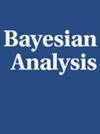计数时间序列的扭曲动态线性模型
IF 2.5
2区 数学
Q1 MATHEMATICS, INTERDISCIPLINARY APPLICATIONS
引用次数: 4
摘要
动态线性模型(DLM)由于其通用的结构、简单的递归更新、处理缺失数据的能力和概率预测,通常用于时间序列分析。然而,计数时间序列的选择是有限的:高斯DLM需要连续的数据,而基于泊松的替代方案往往缺乏足够的建模灵活性。我们介绍了一种新的通过扭曲高斯DLM来计算时间序列的半参数方法。翘曲函数有两个组成部分:一个是提供分布灵活性的(非参数)变换算子,另一个是确保对离散数据生成过程的正确支持的舍入算子。我们为扭曲的DLM开发了共轭推理,这使得能够对状态空间滤波和平滑分布进行分析和递归更新。我们利用这些结果来生成用于推理和预测的定制高效算法,包括用于离线分析的蒙特卡罗模拟和用于在线推理的最优粒子滤波器。该框架统一并扩展了各种离散时间序列模型,适用于自然计数、四舍五入值和多变量观测。仿真研究表明,翘曲DLM具有良好的预测能力。所提出的方法被应用于每日过量计数的多变量时间序列,并证明了建模和计算的成功。本文章由计算机程序翻译,如有差异,请以英文原文为准。
Warped Dynamic Linear Models for Time Series of Counts
Dynamic Linear Models (DLMs) are commonly employed for time series analysis due to their versatile structure, simple recursive updating, ability to handle missing data, and probabilistic forecasting. However, the options for count time series are limited: Gaussian DLMs require continuous data, while Poisson-based alternatives often lack sufficient modeling flexibility. We introduce a novel semiparametric methodology for count time series by warping a Gaussian DLM. The warping function has two components: a (nonparametric) transformation operator that provides distributional flexibility and a rounding operator that ensures the correct support for the discrete data-generating process. We develop conjugate inference for the warped DLM, which enables analytic and recursive updates for the state space filtering and smoothing distributions. We leverage these results to produce customized and efficient algorithms for inference and forecasting, including Monte Carlo simulation for offline analysis and an optimal particle filter for online inference. This framework unifies and extends a variety of discrete time series models and is valid for natural counts, rounded values, and multivariate observations. Simulation studies illustrate the excellent forecasting capabilities of the warped DLM. The proposed approach is applied to a multivariate time series of daily overdose counts and demonstrates both modeling and computational successes.
求助全文
通过发布文献求助,成功后即可免费获取论文全文。
去求助
来源期刊

Bayesian Analysis
数学-数学跨学科应用
CiteScore
6.50
自引率
13.60%
发文量
59
审稿时长
>12 weeks
期刊介绍:
Bayesian Analysis is an electronic journal of the International Society for Bayesian Analysis. It seeks to publish a wide range of articles that demonstrate or discuss Bayesian methods in some theoretical or applied context. The journal welcomes submissions involving presentation of new computational and statistical methods; critical reviews and discussions of existing approaches; historical perspectives; description of important scientific or policy application areas; case studies; and methods for experimental design, data collection, data sharing, or data mining.
Evaluation of submissions is based on importance of content and effectiveness of communication. Discussion papers are typically chosen by the Editor in Chief, or suggested by an Editor, among the regular submissions. In addition, the Journal encourages individual authors to submit manuscripts for consideration as discussion papers.
 求助内容:
求助内容: 应助结果提醒方式:
应助结果提醒方式:


